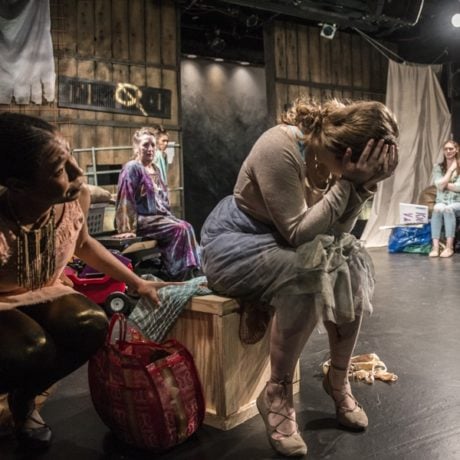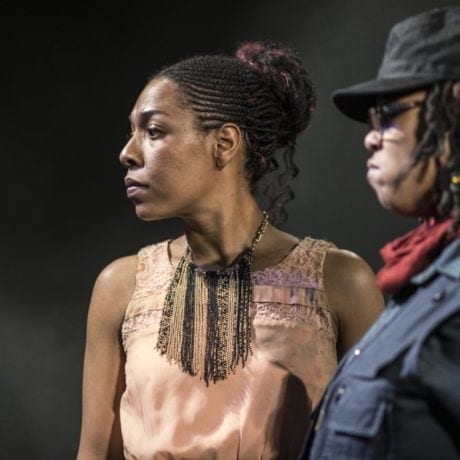The feminist movement has been on the rise for decades, but with our current political and social climate, saturated with patriarchal overreach into women’s lives (and even their bodies), years of progress seem to be unraveling rapidly. In that vein, what better way to bolster the females in your life than to produce and perform a show entirely with women? The Riot Grrrls have done exactly that with their production of Euripides’ The Trojan Women, which opened this weekend.

Riot Grrrls was created in 2008 by the women of Taffety Punk Theatre Company in an effort to bring more women on the stage in a male-heavy theater scene. Their goal was not just to do something new and go against the grain, but simply to allow classically trained, talented female performers the chance to play roles they would otherwise have been overlooked for, solely based on their gender.
The Trojan Women, originally produced in 415 BCE, is one of the first anti-war plays ever written (a trailblazer show for an outside-the-box troupe). Euripides based his play on the history and mythology surrounding the Trojan War. This particular story begins the morning after Troy has fallen, and is a commentary on the aftermath of war, focusing on the mothers, wives, and daughters left behind to suffer.
Hecuba (Brigid Cleary), once the Queen, has seen her husband and sons killed, her daughter raped, and the desolation of her land. But the grief does not solely belong to her. Each women is now considered the spoils of war and is to be given to the men of Greece. Their fate is to be a slave to (or worse still, to share a bed with) the men who murdered their families and desecrated their home.
Hecuba’s daughter Cassandra (Liz Daingerfield), driven to madness by her ability to see the future, is to be given to Agamemnon. Andromache (Shanara Gabrielle), widow of Troy’s greatest warrior and Prince, Hector, is claimed as a concubine to Achilles’ son, Neoptolemus. Even Hecuba, the former Queen of Troy, will become a slave to the Greek general, Odysseus.
And if the deadly destruction of war and the lot that awaits each of women were not suffering enough, Talthybius (Danielle Drake), a Greek warrior, comes to inform Andromache that her baby, Astyanax, is to die. The Greek leaders fear that the boy, Hector’s son and heir, would grow up and desire to avenge his father. For this fear, Talthybius has been instructed to throw the child from the battlements of Troy to his death.
Helen (Sara Dabney Tisdale) is also condemned to death for the role she played in the war. The women of Troy show no sympathy though, but rather they rejoice in the comfort that Helen, the woman who caused their men to fight and die, will meet that same fate.
Menelaus (Liz Daingerfield), Helen’s husband, comes to take her back to Greece to fulfill her death sentence, but Helen pleads with him. Full of remorse and seduction, she clings to him and tries to convince him to spare her life.
Helping to tell the story, were the women of the Chorus: Erica Chamblee, Katie Murphy, Sarah Pretz, and Lynette Rathnam. Not much is learned about them from the text, but each character was very specific and defined, carrying their own sense of history and loss, which speaks to the naturalness of the direction, by Kelsey Mesa.
Mesa has created a reality that was quite easy to become lost in, forgetting that you were watching a show at all but were, instead, privy to intensely private and emotional moments that the women of Troy shared.
Choreographer Kelly King added fluidly expressive movement when the story called for more than words could convey, while sound design and music, by Kathy Cashel, included a variety of modern songs that weaved in and out of the silence and smoothed the transitions from conversation to conversation.
Also a part of the production team was Lighting Designer Mary Keegan, Assistant Director and Fight Choreographe, Teresa Spencer, Prop Designer Crista Noel Smith, and Costume Designer Jen Gillette.
There was an interesting mix of the modern, with the classical style in many aspects of the show. One character wore pajamas, another jeans and a button down, but then others in toga style dresses to be expected in a Greek play. The music was current. But the text stayed true to the originally translated work. While this may sound like a hodge-podge of ideas, the blending of styles and time periods actually worked. The snippets of modern culture created a connection to the characters and the material that might have otherwise been missed. No mention or acknowledgement of the from-another-time costumes, props, or sound was ever made in the play. These things seemed more to serve as visual and audio cues that the audience could identify with, drawing them further into the story.

Greek tragedies are known for material, heavy with pain, and this particular cast of women wore it magnificently. A few of the women play multiple roles, but each character is so different in posture, style, and speech that the doubling is impressively unnoticeable.
Cleary’s Hecuba was captivating, carrying the audience with her every step of the way. Cleary’s ability to be so utterly devastated and broken, while still possessing the command and control of a Queen was incredible to watch.
Daingerfield, as Cassandra, portrayed her madness with terrifying sincerity. And Gabrielle played Andromache’s heart-wrenching moment, when she must hand over her baby, with superb physicality and emotion. Gabrielle seemed to cave into herself, with the realization that her child was to be murdered because of an assumed threat of the man that he will never get to be.
Not only were the performances achingly raw and real, the execution of the language (Euripides wrote in verse) was beautiful. If you are not familiar with the play, think Shakespeare versus Ibsen. The language and cadence are as important as emotion and must be felt and understood by the audience. An actor can cry real tears but, if the audience can’t understand why, they will not be moved.
But Taffety Punk’s Riot Grrrls production of The Trojan Women certainly does move. And if that is not reason enough to go see this show, again consider the opportunity to appreciate and raise up the women of our community; see it as administering self-care and a break from reality; or a chance to exercise your brain and brush-up on Greco-Roman history.
Taffety Punk’s production of The Trojan Women is a beautiful balance of ingenuity, sheer ability, and rich history. Don’t miss it!
Support women and great talent. Support live theater and the Arts. We need them now, more than ever.
Running Time: 90 minutes with no intermission.
The Trojan Women plays through March 4, 2017, at Taffety Punk Theatre Company, performing at the Capitol Hill Arts Workshop – 545 7th Street, SE, in Washington, DC. For tickets, purchase them at the door, or online.





